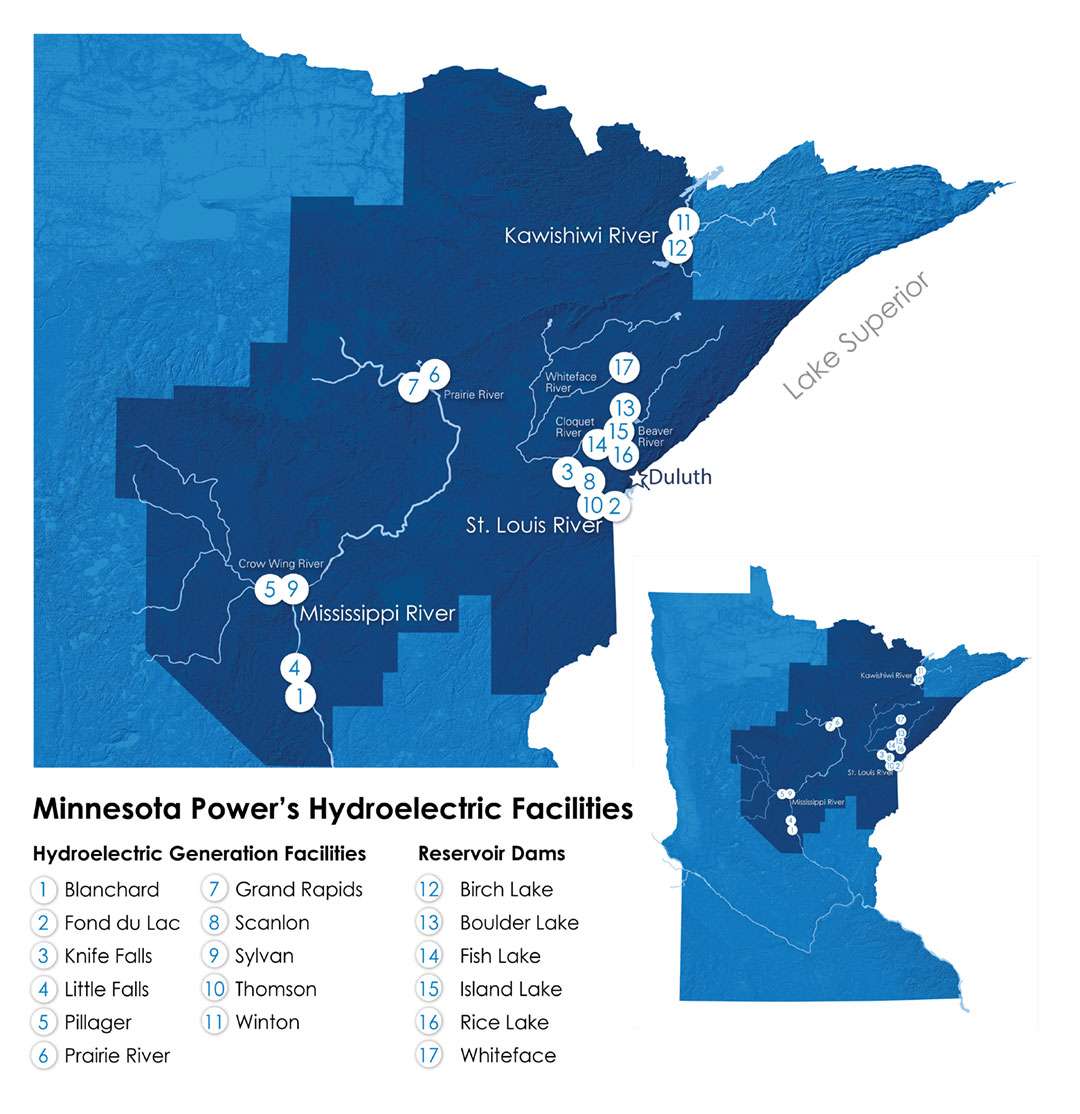Hydro
Hydroelectric stations
Minnesota Power got its start in 1906 by harnessing the energy of the St. Louis River near Duluth, and today operates the largest hydroelectric system in Minnesota. Together, 11 stations produce more than 120 megawatts of electricity.
- Blanchard, Little Falls and Grand Rapids on the Mississippi River
- Winton on the Kawishiwi River
- Pillager and Sylvan on the Crow Wing River
- Prairie River Station on the Prairie River
- Fond du Lac, Knife Falls, Scanlon and Thomson on the St. Louis River
In addition to generating hydropower from our own stations, we also buy hydroelectricity from Manitoba Hydro, based in Winnipeg, Canada. Manitoba Hydro produces most of its power from hydroelectric stations.
In May 2011, Minnesota Power signed a long-term power purchase agreement with Manitoba Hydro. The agreement calls for Manitoba Hydro to sell 250 megawatts of electricity to Minnesota Power for 15 years beginning in 2020. A unique aspect of the agreement is a “wind storage” provision that entitles Minnesota Power to transmit power northward from its wind farms in North Dakota when wind production is high or electric loads are low.
Learn more about our hydro system View current water levels and river flows
Relicensing our hydroelectric facilities
Minnesota Power operates 11 hydroelectric facilities on five rivers in central and northeastern Minnesota. The facilities are operated under eight licenses from the Federal Energy Regulatory Commission.
The licenses permit Minnesota Power to use public waters for energy generation and outline the conditions for hydroelectric plant operations and mitigation of potential environmental impacts. Federal licenses authorize the operation of hydroelectric plants for 30 to 50 years.
In 2017, Minnesota Power began the relicensing process for two of its facilities, the Grand Rapids Hydroelectric Project and the Prairie River Hydroelectric Project. Relicensing for all of our facilities is staggered across the next quarter-century, ending in 2044.
Minnesota Power is following FERC’s Integrated Licensing Process for Grand Rapids and Prairie River. The process takes about seven years and includes scoping documents; studies; consultation with resource agencies, tribes, non-governmental organizations and other stakeholders; and FERC review and analysis before a new license is issued.
Stay informed
You can learn more about how hydroelectric projects are licensed at www.ferc.gov and how you can get involved. To receive notifications when new documents are filed into the relicensing record, register an account with FERC and sign up for its eSubscription service. You also can submit comments to FERC using the eComment service. Learn more here.
Your guide to electronic information at FERC.
In addition, check back here for updates. We will share meeting notes, study plans and other documents required for relicensing as the process unfolds.
FERC Projects - Relicensing and Amendment Related Documents
Grand Rapids Hydroelectric Project
FERC Project No. 2362
Location: On the Mississippi River at approximately river mile 1182 in Grand Rapids, Minnesota.
Capacity: 2.1 megawatts.
Average annual generation: 6,000 megawatt-hours.
Generators: Two (600 kilowatts and 1,500 kilowatts).
Reservoir: About 465 acres just downstream from the Pokegama Dam operated by the U.S. Army Corps of Engineers.
FERC license expires: Dec. 31, 2023.
Other: Hydro station is part of Minnesota Power’s Rapids Energy Center, which provides steam and electric generation to UPM’s Blandin Paper Mill. Station is operated in run-of-river mode using a combination of remote and local operations. The dam was constructed in 1901 and it and the powerhouse were rebuilt following a breach of the dam in 1948.
Notice of Intent and Pre-Application – Grand Rapids Hydroelectric Project – FERC Project #2362
Proposed Study Plan - Grand Rapids FERC Project #2362
Revised Study Plan - Grand Rapids FERC Project #2362
Initial Study Report - Grand Rapids FERC Project #2362
Initial Study Report Meeting Summary- Grand Rapids FERC Project #2362
Grand Rapids Draft License Application Volume 1
Recreation Resources Study - Grand Rapids FERC Project #2362
Prairie River Hydroelectric Project
FERC Project No. 2361
Location: On the Prairie River at approximately river mile 6.3 in Itasca County about four miles north of Grand Rapids, Minnesota.
Capacity: 1.1 megawatts.
Average annual generation: 3,000 megawatt-hours.
Generators: Two (700 kilowatts and 384 kilowatts).
Reservoir: Lower Prairie Lake and Prairie Lake connect via a gorge for a combined reservoir of 1,305 acres.
FERC license expires: Dec. 31, 2023.
Other: Station is operated in run-of-river mode using a combination of remote and local operations. Project comprises a main dam, forebay, reservoir and powerhouse. Generating station was constructed in 1920 and completely destroyed by fire in December 2008. Station rebuild completed in 2013.
Notice of Intent and Pre-Application – Prairie River Hydroelectric Project – FERC Project 2361
Proposed Study Plan - Prairie River FERC Project #2361
Revised Study Plan - Prairie River FERC Project #2361
Initial Study Report - Prairie River FERC Project #2361
Initial Study Report Meeting Summary - Prairie River FERC Project #2361
Prairie River Draft License Application Volume 1
Recreation Resources Study - Prairie River FERC Project #2361
Updated Study Report - Prairie River FERC Project #2361
Final License Application - Prairie River FERC Project #2361
Little Falls Hydroelectric Project
FERC Project No. 2532
FERC license expires: March 31, 2028.
Notice of Intent and Pre-Application - Little Falls - P-2532
Sylvan Hydroelectric Project
FERC Project No. 2454
FERC license expires: March 31, 2028.
Pillager Hydroelectric Project
FERC Project No. 2663
FERC license expires: March 31, 2028.
St. Louis River Project (including Thomson, Fond du Lac, Scanlon, and Knife Falls hydro stations and Island, Fish, Whiteface, Boulder, and Rice headwater reservoirs)
FERC Project No. 2360
FERC license expires: June 30, 2035.Draft FERC Project Boundary Adjustment Application
Land Management Plan - St. Louis River Hydroelectric FERC Project #2360
Blanchard Hydroelectric Project
FERC Project No. 346
FERC license expires: August 24, 2043.Winton Hydroelectric Project
FERC Project No. 469
FERC license expires: March 31, 2044.


